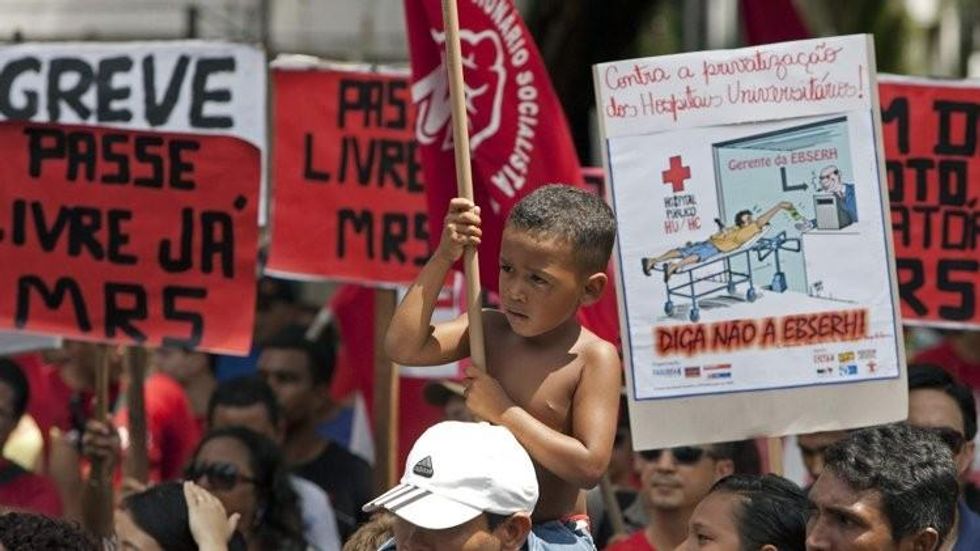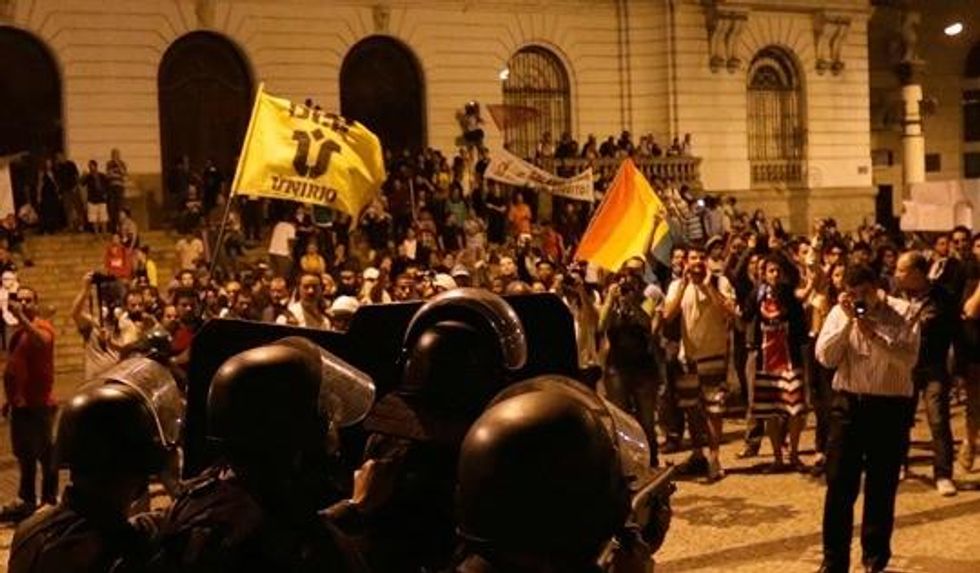

SUBSCRIBE TO OUR FREE NEWSLETTER
Daily news & progressive opinion—funded by the people, not the corporations—delivered straight to your inbox.
5
#000000
#FFFFFF
To donate by check, phone, or other method, see our More Ways to Give page.


Daily news & progressive opinion—funded by the people, not the corporations—delivered straight to your inbox.

Metalworkers, construction workers, teachers, doctors, and other civil servants took part in the day of strikes coined the "Day of Struggle," which was organized by the country's five leading labor federations.
"I haven't had a pay rise in 14 years. "
Throughout the day, strikers demonstrated in all 27 Brazilian states--at times blockading over 80 sections of highway across the country.
According to Al Jazeera, "The strikers are demanding better public transit, health and education services as well as agriculture reform and a reduced work week."
"I haven't had a pay rise in 14 years. I earn 1,900 reals (PS553) net a month," Roberto Salim, a doctor in a public hospital, told reporters.
As the largely peaceful protests moved into the evening, violence broke out as police used teargas and stun bombs on a group of demonstrators in central Rio, which had followed a 20,000 strong march organized by trade unionists.
Numerous protests that have shaken Brazil over the past several weeks have seen brutal police crackdowns--sparking vast popular discontent. Particular fury over a lack in public service funding--amidst government corruption and police brutality--saw the largest of the protests on June 19th, with over a million demonstrators in the city of Rio de Janiero and hundreds of thousands of others in cities across the country.

_______________________
Dear Common Dreams reader, The U.S. is on a fast track to authoritarianism like nothing I've ever seen. Meanwhile, corporate news outlets are utterly capitulating to Trump, twisting their coverage to avoid drawing his ire while lining up to stuff cash in his pockets. That's why I believe that Common Dreams is doing the best and most consequential reporting that we've ever done. Our small but mighty team is a progressive reporting powerhouse, covering the news every day that the corporate media never will. Our mission has always been simple: To inform. To inspire. And to ignite change for the common good. Now here's the key piece that I want all our readers to understand: None of this would be possible without your financial support. That's not just some fundraising cliche. It's the absolute and literal truth. We don't accept corporate advertising and never will. We don't have a paywall because we don't think people should be blocked from critical news based on their ability to pay. Everything we do is funded by the donations of readers like you. Will you donate now to help power the nonprofit, independent reporting of Common Dreams? Thank you for being a vital member of our community. Together, we can keep independent journalism alive when it’s needed most. - Craig Brown, Co-founder |
Jacob Chamberlain is a former staff writer for Common Dreams. He is the author of Migrant Justice in the Age of Removal. His website is www.jacobpchamberlain.com.

Metalworkers, construction workers, teachers, doctors, and other civil servants took part in the day of strikes coined the "Day of Struggle," which was organized by the country's five leading labor federations.
"I haven't had a pay rise in 14 years. "
Throughout the day, strikers demonstrated in all 27 Brazilian states--at times blockading over 80 sections of highway across the country.
According to Al Jazeera, "The strikers are demanding better public transit, health and education services as well as agriculture reform and a reduced work week."
"I haven't had a pay rise in 14 years. I earn 1,900 reals (PS553) net a month," Roberto Salim, a doctor in a public hospital, told reporters.
As the largely peaceful protests moved into the evening, violence broke out as police used teargas and stun bombs on a group of demonstrators in central Rio, which had followed a 20,000 strong march organized by trade unionists.
Numerous protests that have shaken Brazil over the past several weeks have seen brutal police crackdowns--sparking vast popular discontent. Particular fury over a lack in public service funding--amidst government corruption and police brutality--saw the largest of the protests on June 19th, with over a million demonstrators in the city of Rio de Janiero and hundreds of thousands of others in cities across the country.

_______________________
Jacob Chamberlain is a former staff writer for Common Dreams. He is the author of Migrant Justice in the Age of Removal. His website is www.jacobpchamberlain.com.

Metalworkers, construction workers, teachers, doctors, and other civil servants took part in the day of strikes coined the "Day of Struggle," which was organized by the country's five leading labor federations.
"I haven't had a pay rise in 14 years. "
Throughout the day, strikers demonstrated in all 27 Brazilian states--at times blockading over 80 sections of highway across the country.
According to Al Jazeera, "The strikers are demanding better public transit, health and education services as well as agriculture reform and a reduced work week."
"I haven't had a pay rise in 14 years. I earn 1,900 reals (PS553) net a month," Roberto Salim, a doctor in a public hospital, told reporters.
As the largely peaceful protests moved into the evening, violence broke out as police used teargas and stun bombs on a group of demonstrators in central Rio, which had followed a 20,000 strong march organized by trade unionists.
Numerous protests that have shaken Brazil over the past several weeks have seen brutal police crackdowns--sparking vast popular discontent. Particular fury over a lack in public service funding--amidst government corruption and police brutality--saw the largest of the protests on June 19th, with over a million demonstrators in the city of Rio de Janiero and hundreds of thousands of others in cities across the country.

_______________________